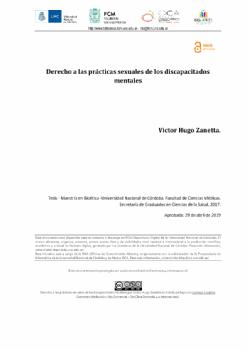| dc.contributor.advisor | Martínez, Hector David | |
| dc.contributor.author | Zanetta, Victor Hugo | |
| dc.date.accessioned | 2020-03-03T21:14:08Z | |
| dc.date.issued | 2019-04-29 | |
| dc.identifier.uri | http://hdl.handle.net/11086/14974 | |
| dc.description | Tesis - Maestría en Bioética -Universidad Nacional de Córdoba. Facultad de Ciencias Médicas. Secretaría de Graduados en Ciencias de la Salud, 2017 | es |
| dc.description.abstract | Hasta hace pocas décadas pasadas, bajo paradigmas propios de la Edad Media, las personas con retraso mental eran literalmente aisladas y permanecían más o menos ocultadas. Estaban predestinadas a la exclusión social. Los familiares y allegados consideraban que los disminuidos no tenían derechos afectivos y sexuales posibles. Todavía persisten algunas familias con actitudes rígidas y creencias dogmáticas. Ellas son contrarias a que sus parientes con trastornos mentales tengan derechos de otorgar y recibir naturales afectos sexuales. No es infrecuente que los padres de disminuidos intelectuales tengan el convencimiento pertinaz de que sus hijos son totalmente asexuados. Dentro de los temores hogareños frecuentes, se destaca nítidamente el miedo al despertar sexual del discapacitado. Frente a este error de apreciación de la realidad vital, se justifica la necesidad de una sensata educación afectiva de la persona con trastornos mentales. En estas personas es imperativo permitir el conocimiento de su propia sexualidad normal. Se torna necesario comprender que ellos tienen las mismas exigencias de vínculos afectivos, similares necesidades de relaciones sociales y parecidos apremios de intimidad corporal y sexual que el resto de los seres humanos. Los discapacitados mentales deben ser honrados en sus derechos a la libertad, sus derechos a la dignidad humana, en su derecho a la igualdad ante la ley y, esencialmente, respetados sus derechos a ser autónomos y tomar decisiones propias, sin injerencia de terceros. Por mandato constitucional, en la República Argentina rige un entramado legal, tanto nacional como supranacional, que ha flexibilizado las restricciones para los disminuidos intelectuales. Es preciso aplicar las leyes nuevas con vigor y de corregir aquellas normas arcaicas remanentes. Es tiempo de eliminar las limitaciones a los derechos personalísimos de las personas con trastornos mentales. | es |
| dc.description.abstract | Until a few decades ago, under typical Middle Ages paradigms, people with mental retardation were literally placed in mental asylums and remained generally out of sight. They were predestined to social exclusion. Relatives and friends considered that mentally disabled people had no possible sexual or affective rights. Nowadays there still are some family members with rigid attitudes and dogmatic beliefs about that. They opposed to acknowledge their mentally disordered relatives´ rights to grant and receive natural sexual affection. It is not uncommon for parents of impaired intellectuals to have the obstinate conviction that their children are totally sexless. Within the frequent home fears, the sexual awakening of the disabled is clearly highlighted. Faced with this error of appreciation of the vital reality, the need for a sensible affective education of the mentally disordered person is justified. Nevertheless, it is imperative to allow mentally disabled people to acknowledge their own normal sexuality. It becomes necessary to understand that they have the same demands of affective bonds, similar needs of social relations and constraints of corporal and sexual intimacy than the rest of human beings. The mentally handicapped must be honored in their rights to freedom, human dignity, legal equality, but it becomes essential to respect their right to be autonomous and make their own decisions without interference from third parties. Due to constitutional command, there is a national and supranational legal framework in Argentina that has relaxed restrictions for disabled intellectuals. However, it is still necessary to vigorously enforce the new laws and to correct those archaic remaining rules. It is time to remove all limitations on the very personal rights of mentally handicapped people. | en |
| dc.language.iso | spa | es |
| dc.rights | Attribution-NonCommercial-NoDerivatives 4.0 Internacional | * |
| dc.rights.uri | http://creativecommons.org/licenses/by-nc-nd/4.0/ | * |
| dc.source | Zanetta VH. Derecho a las prácticas sexuales de los discapacitados mentales [Internet]. Universidad Nacional de Córdoba. 2019 [citado el 5 de marzo de 2020]. Disponible en: https://rdu.unc.edu.ar/handle/11086/14974 | es |
| dc.subject | Research Subject Categories::MEDICINE | es |
| dc.subject | Research Subject Categories::MEDICINE::Psychiatry | es |
| dc.subject | Derechos Sexuales y Reproductivos | es |
| dc.subject | Sexualidad | es |
| dc.title | Derecho a las prácticas sexuales de los discapacitados mentales | es |
| dc.type | masterThesis | es |
| dc.description.embargo | 2021-04-29 | |
| dc.description.fil | Fil: Zanetta, Víctor Hugo. Universidad Nacional de Córdoba. Facultad de Odontología. Cátedra de Semiología; Argentina. | es |





